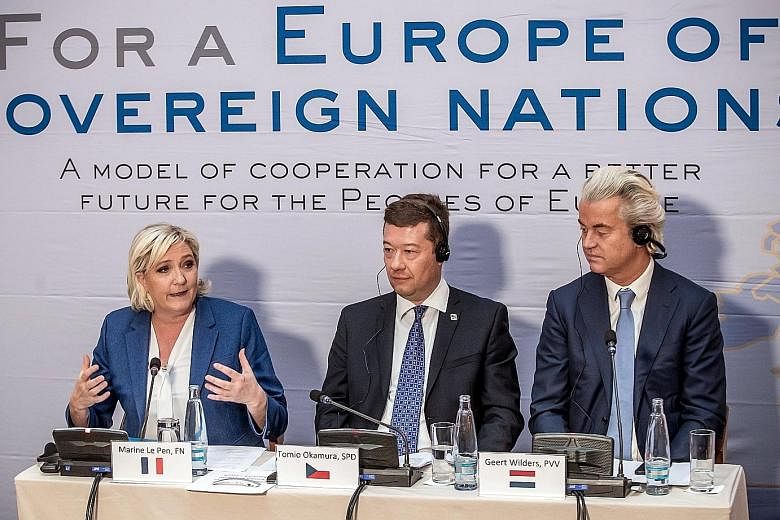At the start of this year, few were optimistic about Europe's political outlook, for the continent seemed ripe for a takeover by populist or extremist politicians, seething with racial hatred and bent on reviving old nationalist disputes.
Ms Marine Le Pen of France's National Front kicked off her bid for the presidency with all the populist flourish which propelled Mr Donald Trump to the White House. Wherever she went, she was greeted by anti-immigrant chants of "This is our country". In the Netherlands, the far-right Party for Freedom led by Mr Geert Wilders was far ahead in the polls; his "There is no such thing as 'moderate Islam'" slogan was popular. In Europe's biggest country, the Alternative for Germany (AfD), a nationalist anti-immigrant movement, seemed unstoppable.
All these anti-immigrant movements failed to gain power. Mainstream politicians retained control in the Netherlands. Germany's Chancellor Angela Merkel came well ahead of all opponents in the September elections - even though she now struggles to cobble together a coalition. In France, Ms Le Pen was soundly beaten by Mr Emmanuel Macron, a newcomer who stormed to power on a crushing two-thirds majority of the votes.
The only exception is Austria, where the far-right Freedom Party joined the government led by Mr Sebastian Kurz's conservatives.
So, are Europe's extremists now a busted flush? Far from it; at best, their march to power has been deflected, rather than defeated. And that's not because their poisonous ideology of racism and economic protectionism has been refuted but rather, because Europe's electoral systems make it quite hard for populists to win power in one swoop.
In the Netherlands general election in March, a coalition of moderate parties retained power. But Mr Wilders' share of the vote went up by a third, to 13 per cent of votes cast; his party is the second-largest, hardly a rebuff to extremism.
Matters are even more dramatic in Germany, where a party must obtain at least 5 per cent of votes cast before parliamentary representation, precisely in order to prevent extremists from gaining influence. The AfD not only smashed through this threshold, it got 12.6 per cent of the vote and overnight became Germany's third-biggest party.
In France, the nation's two-round electoral system defeated Ms Le Pen by encouraging voters to unite against her in the second round; in the first, she won 21.3 per cent of the vote, not far behind Mr Macron's 24 per cent. Still, she managed to get a third of all votes.
Europe's political predicament may be even worse, for the continent is witnessing an apparently unstoppable decline in the dominance of all its established political formations. In the Netherlands, the venerable Labour Party collapsed. In Germany, the centre-left and the centre-right, which between them used to control up to 80 per cent of the vote, attracted barely half the ballots, with the Socialists recording their worst result in a century.
And in France, the old political system simply melted down, a phenomenon likely to be repeated in Italy which goes to the polls in 2018. Europe's problem is not only how to deal with the rise of populists, but also that its entire existing political system is collapsing from within.
That does not mean politicians of the extreme right or left are about to take over. Extremist parties are divided from within, and inexperienced. The downturn is over, giving populists fewer opportunities to play on voters' frustrations.
Still, the governments are living on borrowed time. For they still have to decide whether their best bet to defeat the populist tide is to confront and refute extremist ideas directly, or to implement policies such as tighter border controls or protectionism in order to take the sting out of this populist rebellion.
Jonathan Eyal


